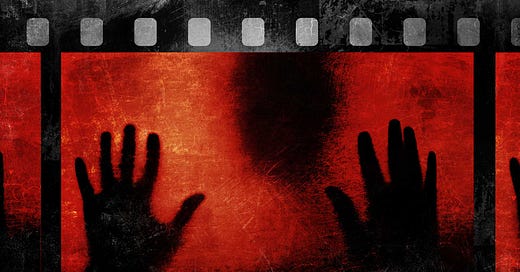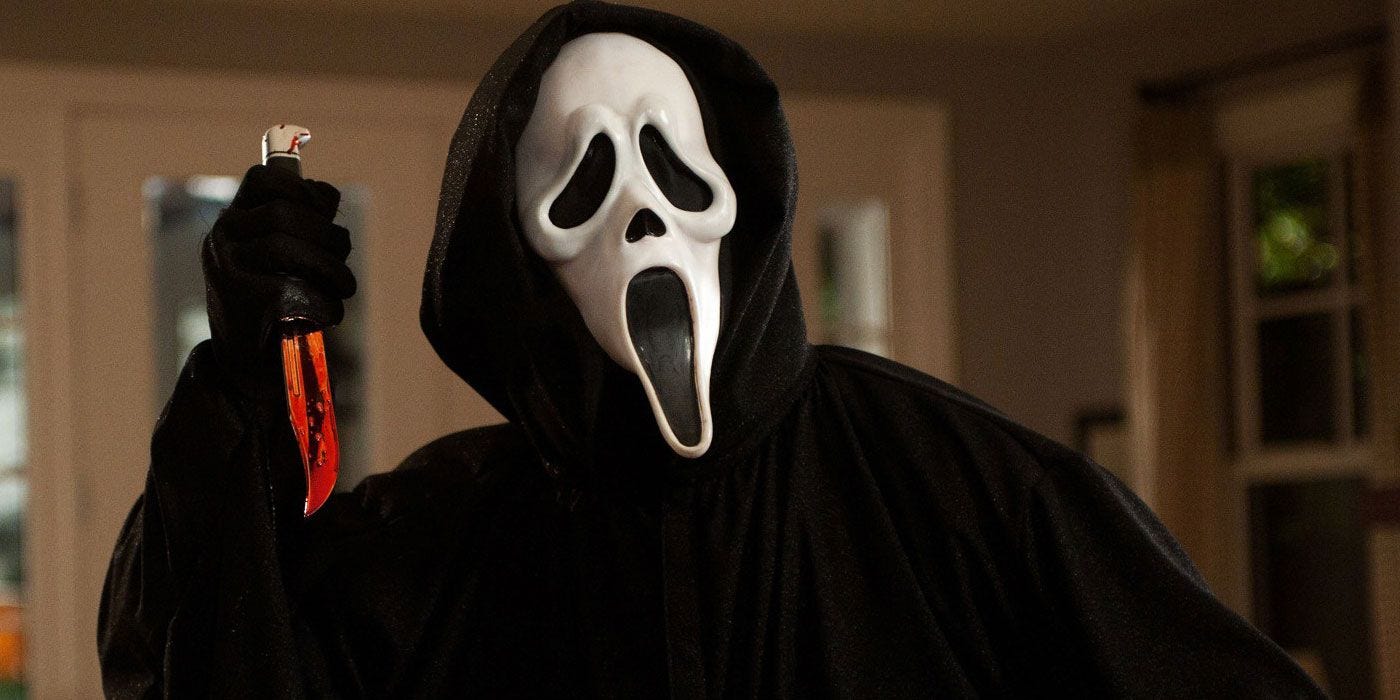I’ve been having amazing dreams lately. Just wonderful little stories that leave me feeling happy upon waking. I had one last night in which I fell asleep and had a dream (yes, a dream within a dream) that I came up with the perfect screenplay idea, and then woke up and tried to scribble down as much as I could remember. I got about halfway through the story before my memory failed me, but I wasn’t despondent. I was grateful I had been gifted so much of it. Then I woke up for real and remembered none of it, but I was still high from the burst of creativity, and was grinning ear to ear.
The night before, I had a dream where I got to visit with one of my dogs who died last year. She was all white now, as if she had kept aging, and was so grateful to see me. That very same night, I had another dream, this one of bumping into my very first girlfriend and sharing an amazing hug.
My theory is that these dreams are the result of all the horror movies I’ve been watching.
I know it’s counterintuitive. Most people think horror movies will give them nightmares. I used to be one of them. I’ve spent most of my life avoiding horror. I wasn’t exposed to it as a child; my mother must have thought horror movies were either too trashy or too scary, and I never forced the issue. I didn’t beg her to let me rent one or sneak out to watch them at a friend’s house. Horror is a genre you need an older person to push you towards, and no one in my life ever did. In the defense of my mother and the older kids I knew, it was a fallow period. The great slasher films of the late ‘70s and early ‘80s (Halloween, A Nightmare on Elm Street, Friday the 13th) had been franchised to death and were at their nadir. It wasn’t until Scream came out in 1996 that the genre re-found its footing.
A low tolerance for terror followed me throughout my twenties, but eventually, the world shamed me into it. Over the last 15 years or so, horror has simply become the dominant genre of our era. It has replaced superheroic acts with stabbings, throat-slashings, and dismemberment. Ever year, dozens of new horror films come out. Horror has even spread its wings into comedy (Get Out) and prestige drama (Hereditary), while still leaving plenty of room for slashers and the supernatural. There was even a horror superhero movie, 2019’s Brightburn, which essentially asks the question, “What if Superman was evil?” As a film critic, my unease with horror became more and more of a liability. I avoided assignments to cover these films and felt shame over it. How could I consider myself an expert in cinema while ignoring this exploding genre that was clearly striking a chord with millions of viewers?
Then I heard from the master. One day, I stumbled upon an old episode of Late Night with David Letterman in which Martin Scorsese was asked about horror, and he paraphrased a British critic who said, “If you don’t understand or appreciate the horror genre, you really have no understanding or love of film itself.” Even with my minimal horror experience, I knew instantly what he meant. Cinema is the art of making the viewer feel through shadow and light and sound. That’s the whole point, and horror may be its purest form. It can make you fear for your very life while sitting in the safety of your living room. It activates your flight-or-fight mechanism, putting your body back in a primitive state. And it does this using only the fundamental tools of cinema.
I began dipping my toe into horror, but it wasn’t until this year that I had my first proper late October spook-a-thon (it would have started earlier if not for those pesky Mets). I’ve watched 13 horror films in 9 days. I watched slasher flicks, “found footage” movies, body horror, and supernatural horror. They all terrified me, but found footage scares me the most. Setting supernatural activity against documentary-style realism is an irresistible combination. These films are typically short—2020’s Host, about a seance over Zoom that goes wrong, is only 57 minutes long—but that’s because they’re so scary they really can’t be any longer. People would have heart attacks. I had a similarly great time watching Paranormal Activity, a low-budget found footage film about a young couple dealing with a demon in their new house. At first, he makes himself known through eerie footsteps and creaking doors, before moving onto a more hands-on approach. I’ll tell ya: It’s a terrifying film to watch in a converted attic of an old New England house that creaks constantly for no reason at all.
What else? The Substance, which was just released this year, is the wildest bit of body horror I’ve ever seen. 1974’s Black Christmas is a classic sorority house slasher, but it contains some of the most beautiful kills. I also caught the newly-released Smile 2 in a theater. I was alone in the theater during the trailers, which was scary enough, until a woman came in and sat two seats away from me. I was terrified for a moment, until she struck up a conversation. She was perfectly nice, and we had a great time watching the film together, relying on each other for grounding during the film’s most tense scenes.
Then there’s In a Violent Nature, another 2024 release, that takes the classic serial-killer-stalking-teenagers-in-the-woods trope and flips it by making the killer the protagonist. We follow him walking slowly through the woods, spotting his prey from a distance, slowly getting closer and closer before dispatching with them in increasingly creative ways. The effect is to remove most of the suspense from the set-up; there are no jump scares when you’re tracking with the killer. Instead, it hypnotizes. Honestly, I could have simply watched him walk around the woods the whole time—the snapping of the twigs foreshadowing the crunching of bone—and dispatched with most of the kills altogether.
So why are these frightful films giving me such wonderful dreams? Here’s my theory. We all live with a lot of fear. Maybe you’re afraid of death. Or embarrassment. Or intimacy. Or failure or success. We all have something, and we bury that fear so that we can get through the day. And maybe we bury more positive feelings along with it. Our suppression mechanism isn’t so precise. We just shove a bunch of primal emotions down into our subconscious somewhere and hope we can make do without them. Fear is the most primal of all, the one that lives on top of the rest.
Horror externalizes my fear. It brings it right up to the surface, which is the therapeutic value of cinema. It allows me to feel things in a safe space that otherwise might overpower me. And maybe because I let that fear out of my subconscious, I made some room for everything else to rise to the surface along with it. It’s a release valve that we need in order to keep our emotions in balance. Maybe this is why people who love horror just can’t stop watching it. And maybe I’m one of those people now.






This is such a beautiful piece and recognition of a genre that I love but have always struggled to put that adoration into words. This is how true crime feels for me as well. A way to slowly let my fear rather than bury it.
Great essay! I used to watch so many horror movies. Now that I’m a parent, I cannot stomach harm to a child (or animal). Now I have to read reviews, plot synopses, Reddit, etc before watching the movie. I need to know what happens, who lives, who dies, and who did it or I get way too anxious.